Robert Jenrick is the Secretary of State for Housing, Communities and Local Government. Most people have probably never heard of him.
If you are aware of his existence, it might be to do with the fact that in 2020 he was involved in a controversial decision which helped out Richard Desmond, the Conservative Party donor and owner of Northern and Shell (former owner of the Daily Express and various porn magazines and porn TV channels). Jenrick overruled a Planning Inspectorate’s decision that Desmond’s £1 billion luxury housing development should provide more affordable housing units. The timing of the decision (the day before a new council community levy was introduced) saved Desmond’s company around £40 million in tax, and Tower Hamlets council calculated that Jenrick helped Desmond save a further £106 million through relaxing his obligations on affordable housing provision. Shortly after this, Desmond made a personal donation to the Conservatives.
Jenrick’s other claim to fame is a controversial 150 mile trip during the lockdown, despite urging the population to stay at home. Other than that he should be well known for being the latest Housing Minister to fail to sort out the problem of flammable cladding on blocks of flats following Grenfell, or to make any headway in helping to provide affordable homes – to buy or to rent – for the millions in need.
But now Jenrick has struck out on to new territory. In what the Tories clearly regard as red meat for their support base, he has announced new legislation as part of their culture war to defend ‘our history’ and specifically ‘our statues’. The enemy at the gates is a terrifying coalition of ‘woke militants’, the ‘baying mob’, the ‘flash mob’ (does he even know what that is?), and the ‘cultural committee of town hall militants and woke worthies’.
When he stops frothing at the mouth, he manages to equate defending statues of slavers like Colston in Bristol with defending ‘our’ history and – even worse – ‘conservation’. He tells us that he’s very keen on conservation because ‘it’s at the heart of conservatism’ (geddit?). Has it occurred to him that tearing ‘down great buildings’ is not the same as removing a statue of a slaver? This is especially so when it is not even a product of the time (a common defence) as, in the Colston case, it was erected in 1895 – 174 years after his death. While the statue didn’t go up until almost two centuries after Colston died, it was no coincidence that this was at the height of the Scramble for Africa when all the imperialist powers of the world, including the British Empire, the most powerful at the time, were invading and seizing as much of Africa as they could. So, celebrating a key participant in the transatlantic slave trade probably made a lot of sense to the cheerleaders of Empire.
Jenrick recycles many of the same tired old excuses as everybody else with a statue fetish, but essentially they fall into two categories: first, by removing the statues we censor history and secondly, more generally that there is such a thing as ‘our’ history in which we all share, that is encapsulated by these ‘public statues and monuments… erected to celebrate individuals and great moments in British history.’ Both are wrong.
Jenrick says:
To tear them [statues] down, is, as the Prime Minister has said, “to lie about our history”. It is also to needlessly denigrate and distort our past, rather than to educate, inform and unite people. It is a path we see our American cousins are well travelled upon. And we can, I hope, agree that we don’t want to follow.
The path the ‘American cousins are well travelled upon’ is of course the removal of statues and memorials that celebrate the Confederate rebellion against the US Congress in order to defend slavery in the southern states. Many of the same arguments are used by the apologists for the slaveholders’ rebellion as used by Jenrick. It’s history, you can’t ignore it, you have to place it in context, the statues were a product of their time. Except they weren’t. According to the Southern Poverty Law Center, the vast majority of the 1500 Confederate statues and memorials that existed in 2017, often standing outside State Capitols and Courthouses, were erected during two periods: the first at the beginning of the 20th century and the second in the 1950s and early 1960s at the peak of the Civil Rights Movement. The first spike coincided with the southern racists regaining control of the South through the ‘Jim Crow’ laws and the second spike was a backlash in response to the advances of the Civil Rights Movement.
Timeline of Confederate Monuments in USA

So the path that some of the ‘American cousins’ are travelling is to remove the overt symbols of white supremacy, racism and the glorification of a slave state from public spaces. To do what Jenrick wants – that is, not to follow the ‘American cousins’ – would be to accept that it’s OK to have these statues and memorials in public places. Yeah, suck it up pinkos and black people!
But what would Jenrick or other members of the British ruling elite think if Germany had this attitude? Would they be OK with statues of Hitler, Goebbels, Himmler and the rest, side by side with celebration memorials of the martial prowess of the Waffen SS and the contribution of the Nazi regime to the building of the autobahns? After all it is part of Germany’s history. And as Jenrick says:
We cannot – and should not – try to edit or censor our past. At the heart of liberal democracies is a belief that history should be studied, not censored.
So, the Germans should surely not ‘seek to erase’ part of their history. No doubt the Allied military governors in 1945 had the same approach as Jenrick and believed that ‘…such monuments are almost always best explained and contextualised, not taken and hidden away’ and that
We won’t allow people to censor our past or pretend we have a different history to the one we have.
If only we could know what the British and other Allied Military Governors of Germany did when judging whether removing statues was ‘censoring history’. Oh, wait a minute, we do know.
Directive No. 30 Liquidation of German Military and Nazi Memorials and Museums was issued in May 1946 and signed on behalf of the Allied Control Council by the Military Governors of the four occupying powers: Lieutenant General B.H. Robertson for the British forces, L. Koeltz, General de Corps d’Armee, for the French forces, Lieutenant General M.I. Dratvin for the Soviet forces and Lieutenant General Lucius D. Clay for the US forces. It states:
On and after the date of this directive, the planning, designing, erection, installation, posting or other display of any monument, memorial, poster, statue, edifice, street or highway name marker, emblem, tablet, or insignia which tends to preserve and keep alive the German military tradition, to revive militarism or to commemorate the Nazi Party, or which is of such a nature as to glorify incidents of war, and the functioning of military museums and exhibitions, and the erection, installation, or posting or other display on a building or other structure of any of the same, will be prohibited and declared illegal; also the reopening of military museums and exhibitions.
Every existing monument, poster, statue, edifice, street, or highway name marker, emblem, tablet or insignia, of a type the planning, designing, erection, installation, posting or other display of what is prohibited by Paragraph I of this Directive must be completely destroyed and liquidated by 1 January 1947; also all military museums and exhibitions must be closed and liquidated by 1 January 1947 throughout the entire German territory.
So the reason we don’t see statues of Hitler or Nazi memorials in Germany is that the Allied powers including Britain, did not see it as a censorship of history, rewriting history, erasing the past, destroying heritage, or any of the other nonsense churned out by Jenrick and others to defend statues of slavers. In fact, the Allies saw the tearing down of these symbols as an important part – not enough on its own – of destroying any legacy of the Nazis that remained.
There is also the more recent example of the pulling down of the statue of Sadaam Hussein in Baghdad and, as far as I know, not a single Tory MP uttered a word regretting the deed as depriving the Iraqi people of the opportunity of understanding their history (with the appropriate contextualised explanation of course).
The truth is that these statues and memorials are literally symbols. That is their entire purpose. They are not there to provide history lessons in sculptured form. They are usually an exercise in the projection of power, symbols of what the ruling elite wish to memorialise.
It is not surprising that they become targets in periods of popular upsurge. The pulling down of the Vendome Column (commemorating Napoleon and his imperialist wars) during the Paris Commune in 1871 was described by William Morris and E Belfort Bax as follows:
And though in itself the destruction of the Vendome Column may seem but a small matter, yet considering the importance attached generally, and in France particularly, to such symbols, the dismounting of that base piece of Napoleonic upholstery was another mark of the determination to hold no parley with the old jingo legends.
Similarly, the destruction of the statue of Stalin in Budapest during the Hungarian Workers’ Revolution of 1956, leaving just his boots, was another iconic moment.
Jenrick assumes that there is just one interpretation of history, that it is possible to speak of ‘our’ history as a shared experience, one that is a value free collection of facts. But the choice to omit or include or emphasise certain facts happens all the time and structures what we know of as history. If this were not true, we would see a very different range of monuments and statues around the country marking ‘our’ history.
Look around where you live and you will quickly see what is valued by those in power, and it is primarily a celebration and commemoration of Imperial Britain. Of course, there are the odd exceptions to that, but if we were to mark important events or people that improved the lives of working people, the urban landscape would look very different.
Jenrick would no doubt consider that to be a ‘negative narrative’, a better description would be a broader and therefore more honest examination of history, which includes the lives of ordinary people. Without that, no wonder that there is such ignorance of, and dewy-eyed sentimental nostalgia for, a distorted vision of what the Empire was and did. It’s shadow hangs over modern Britain today as shown by polling and this feeds through to attitudes to current issues. A Yougov poll in March 2020 found that 32% thought the Empire was more something to be proud of rather than ashamed of (37% were indifferent and 19% thought it a matter of shame). Broken down by party affiliation, 53% of Conservatives and 21% of Labour supporters felt the empire to be a source of pride.
33% thought that the former colonies were better off for being colonised and 27% say they wish Britain still had an empire. 54% of Conservatives and 21% of Labour supporters thought those countries colonised were better off for the experience and 38% of Conservatives and 20% of Labour supporters would like Britain to still have an empire.
Yet the Empire on which ‘the sun never set’, was based on brutal invasion, conquest, sometimes settlement, subjugation and sometimes enslavement, often mass imprisonment and torture of the population and theft of land and natural resources all over the world from Ireland to Iraq.
It was a leading force in the slave trade and slavery (belatedly bringing it to an end in the wake of slave rebellions throughout the colonies), invented concentration camps in South Africa, acted as an international drugs dealer in enforcing and controlling the import of opium into China and deliberately boosted mass addiction.
Having invaded and conquered other people’s land in every continent except Antarctica, it used its economic and military superiority to impose its will and enrich Britain’s ruling elite while throwing a few crumbs to the British working class. It engaged in high technology killing of anyone resisting conquest, deploying air power and gas against people armed with nothing much more than rifles in many cases.
It massacred unarmed indigenous people in Ireland at Croke Park, in Amritsar in India and in Tasmania in Australia. Its military and local auxiliaries used repression and assassinations in the Caribbean islands, Cyprus, Greece, Ireland, Kenya, Malaya and may other places. It became expert in the use of the politics of divide and rule which left a poisonous legacy leading to mass deaths and refugees even when the imperial forces withdrew – in India, Cyprus and Palestine for example. And it presided over avoidable famines in Ireland and Bengal costing millions of lives. There are not too many statues to that part of ‘our’ history.
Despite the colonialist myth that the colonised benefited, even supported their own colonisation, each and every part of the Empire saw resistance, revolutionary upsurges, insurrections, civil disobedience, general strikes, demonstrations and guerrilla war in the fight for independence. There is not much commemoration of this part of ‘our heritage’ in Britain.
But the British ruling class did not reserve their brutality for foreigners. They applied it at home too. The violence of the enclosures forced people off the land and laid the basis for a mass factory working class in the industrial revolution where the daily violence of the workplace created a country of malnourished children, disease-ridden hovels and short miserable lives for working people.
When anyone was foolish enough to believe that another world was possible they were met by the full force of the state in support of the employers in the shape of the police, troops and the judiciary. British military massacred civilians overseas but they did it at home too – Peterloo and Newport for example. Troops, militia and police have been used against strikers since there have been strikes – as in Merthyr, Tonypandy, Llanelli, Liverpool, Glasgow, the General Strike and at Orgreave. They were almost invariably described as ‘a mob’ at the time. There are not too many memorials to this aspect of ‘our’ history either.
The ‘weft and weave of our uniquely rich history’ that Jenrick eulogises is mostly exactly that – a history of the rich, with the ordinary people airbrushed out more effectively than any photoshop application. Far from attempting ‘to impose a single narrative, often negative’ as he accuses, the real task is to recognise that the version of ‘our history’ that the Tories defend is a one-sided look at the past in order to defend the privileges of the present. Britain is a deeply flawed democracy – even by the limited standards of liberal democracy. It has only had universal suffrage since 1929, it has an unelected second chamber and a hereditary monarchy as head of state, we have an unbalanced electoral system and political contests in which private wealth and influence play an ever greater part.
Recognising the history of popular struggles for democracy is at the heart of our history. Whether it be for workers’ rights, for universal suffrage, against racism and fascism, for equality for women, for LGBTQ rights, everyone of these movements has been stigmatised as a threat to stability and order by those in authority and power. Jenrick describes those who want to remove statues of slavers as ‘a baying mob’ and in this he is at one with every reactionary in British history. Every time, a movement for democratic reform has emerged in Britain the wealthy and powerful have decried it as the work of the mob. Wellington was typical in his response to the (very limited) proposed Reform Act, when he said in 1831:
I don’t believe that there is a man in England who does not think that this Reform must lead to the total extinction of the power and property of this country… the mob, the Radicals, the dissenters from the Church of all religious persuasion hail the Bill as the commencement of a new era of destruction and plunder.
Macaulay spoke for the ruling class when he railed against the People’s Charter in 1842:
My firm conviction is that, in our country, universal suffrage is incompatible not with this or that form of government, but with all forms of government, and with everything for the sake of which forms of government exist; that it is incompatible with property, and that it is consequently incompatible with civilization.
As Paul Foot explained in The Vote, what Macaulay believed was that democracy was a threat to wealth held by the few: ‘any government elected by the mass of the people who had no wealth was certain to start by expropriating the wealth of the rich’. Tories and Whigs considered democracy to be synonymous with mob-rule and they haven’t changed their view much since then.
Marx reminded us that
Men make their own history, but they do not make it as they please; they do not make it under self-selected circumstances, but under circumstances existing already, given and transmitted from the past.
Gwyn Alf Williams, the Welsh Marxist historian put it this way:
The past is chaos. We in the present make sense of that past by manufacturing a history out of it. We do that by putting questions to it and the kind of questions you put depends on who you are, what you are, when you are… To my mind, the kind of questions we need to put are the ones that serve the majority…
It is this history, this heritage and tradition of the fight for democracy and its widest extension to every aspect of life that socialists support, and it’s why people like Jenrick regard us as ‘the mob’.





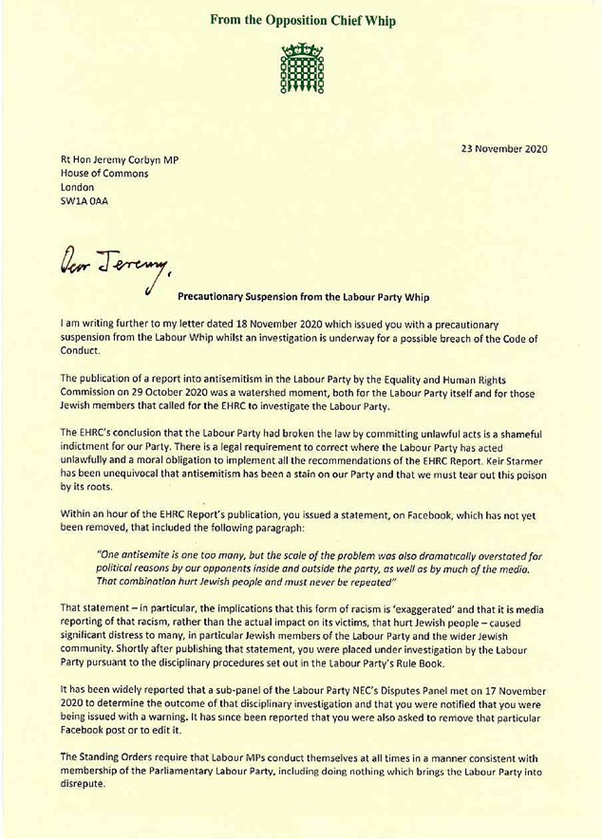

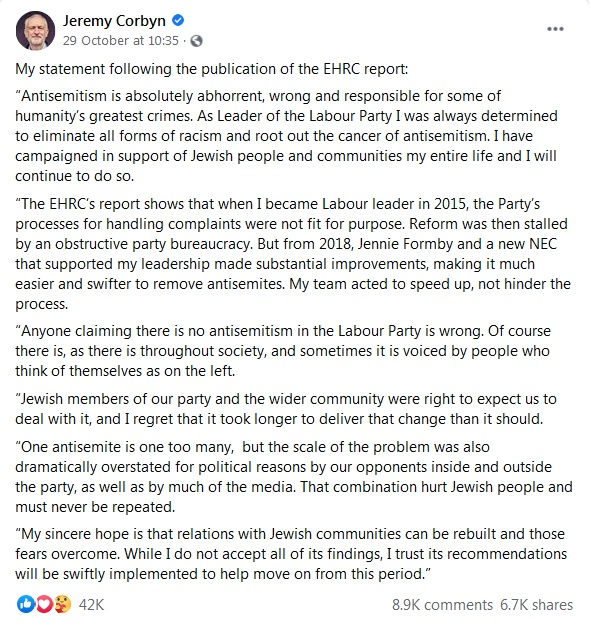


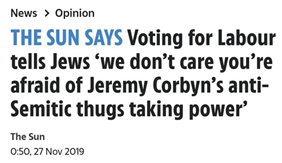

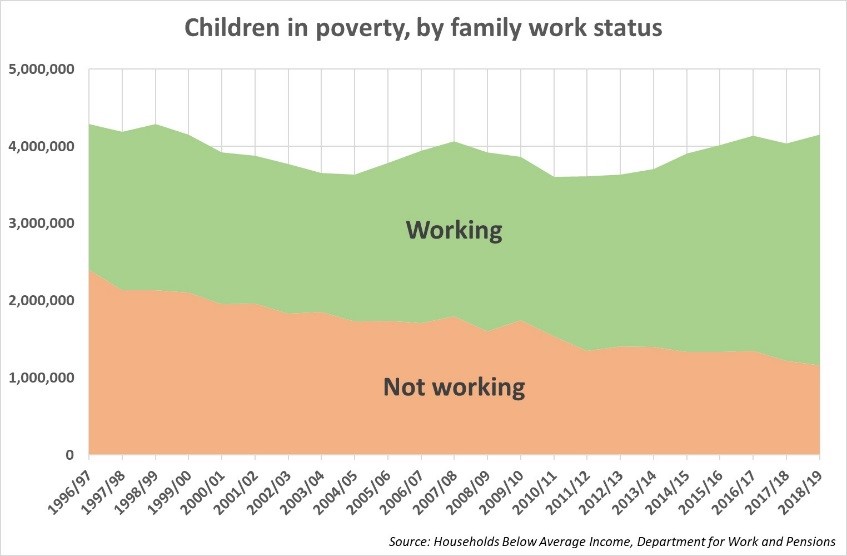

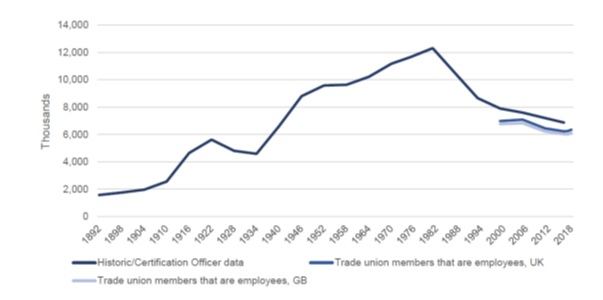
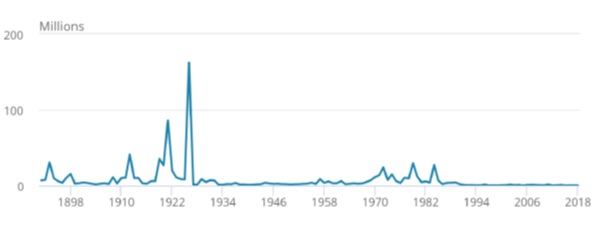
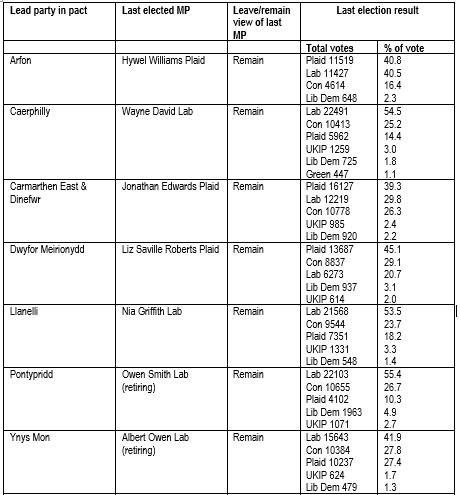
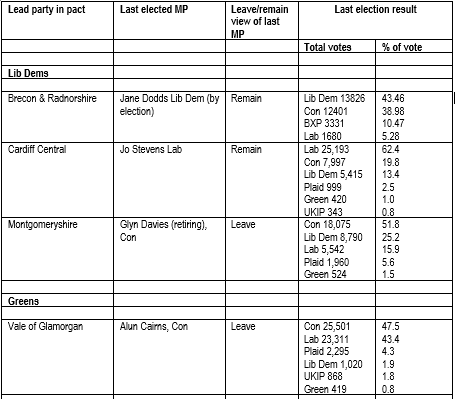
You must be logged in to post a comment.